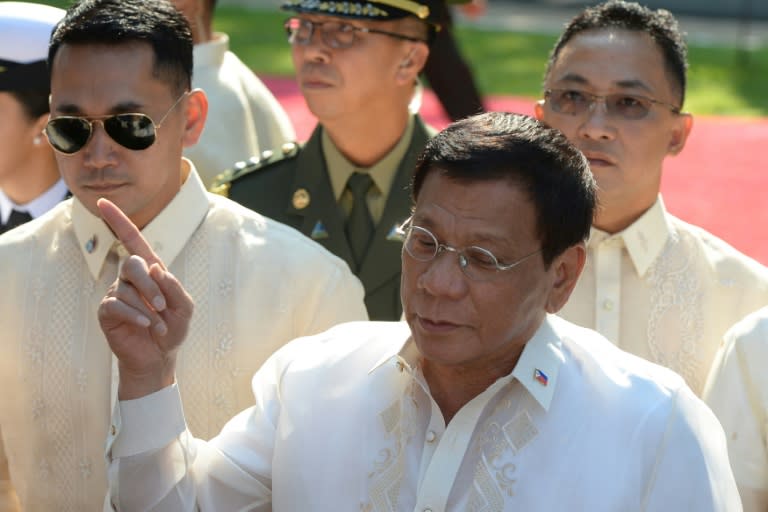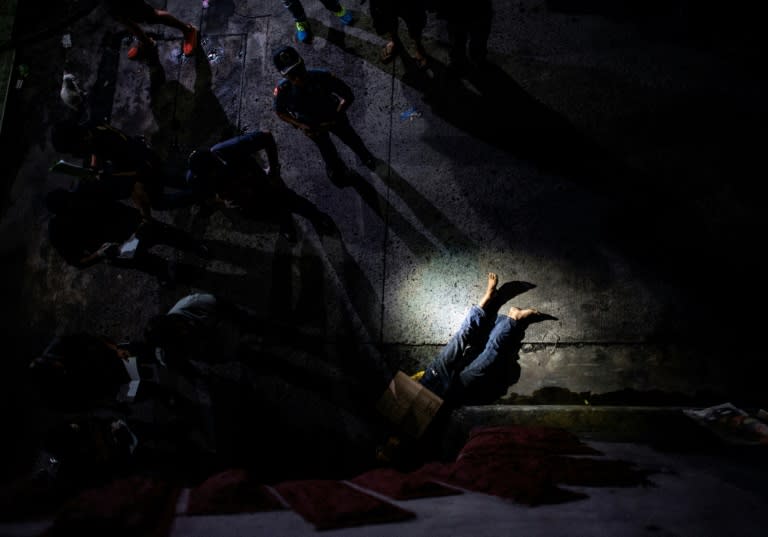Philippines' Duterte warns of thousands more drug killings
Philippine President Rodrigo Duterte said Thursday he wanted to behead opponents of his drug war and warned 50,000 people could die in the crackdown, after rejecting European Union aid in response to its criticism of the killings. Duterte insisted he would not be intimidated by criticism of the drug war, which rights groups have said could be a crime against humanity. "Don't trust those human rights (critics), if you do I will cut off both your heads," Duterte said in a speech to inaugurate a bridge in the southern Philippines. "I will not be influenced by any fear. Jail me. So jail me. If they say I should be jailed, okay. Fine. I'll pay the price." Duterte said human rights activists had alleged that 10,000 people had died in his drug war since he came to power in the middle of last year, but warned of many more deaths in his quest to eradicate drugs in society. "Make that 50,000. I will really finish them off. And even if I go to hell, I can rot in prison. I do not mind. I am old." Duterte's comments came shortly after his spokesman said the Philippines would refuse European Union grants that "interfered" with its internal affairs. The European Union has been one of the most vocal international critics of the drug war. "The president has approved the recommendation of the department of finance not to accept grants... from the EU that may allow it to interfere with the internal policies of the Philippines," presidential spokesman Ernesto Abella told reporters. Abella said one grant had already been declined for having "objectionable" conditions attached to it, although he refused to elaborate. The European Union is the Philippines' eighth biggest source of aid, with assistance last year worth $217 million, according to government data. Much of the aid is spent on projects to help end Muslim and communist insurgencies in the southern Philippines. It was not clear how much money was in jeopardy. Abella said humanitarian aid would still be accepted but the EU ambassador to Manila, Franz Jessen, said the decision impacted 250 million euros ($278 million) in grants. Economic secretary Ernesto Pernia added to the confusion by saying the announcement of rejecting aid may just be a response by Duterte to the criticism and he may retract it. - Angry responses - Duterte, 72, has repeatedly criticised European lawmakers and the EU for condemning his drug war. The European Union has said it is reviewing Philippine exports' duty-free status because of rights concerns, which also include Duterte's plans to bring back the death penalty and lower the age of criminal responsibility to nine. Duterte last year used vulgar language and raised his middle finger in response to a European parliament statement expressing concern over the killings. The German government also expressed concern after Duterte last year drew parallels between his drug war and the Holocaust perpetrated by Adolf Hitler's Nazi Germany. "Hitler massacred three million Jews. Now there are three million drug addicts (in the Philippines). I'd be happy to slaughter them," Duterte said, underestimating the number of people killed in the Holocaust. Duterte later apologised for the Hitler reference but said he was "emphatic" about wanting to kill addicts. Duterte easily won presidential elections last year after promising to end crime by killing tens of thousands of drug traffickers and addicts. Police have reported killing about 2,700 people since Duterte took office at the end of June and immediately launched his war on drugs. Unknown assailants have killed more than 1,800 others, while about 5,700 other violent deaths are under investigation, according to police data. Partly in response to American criticism of the drug war, Duterte has also loosened the Philippines' ties with traditional ally the United States. Duterte has instead embraced China, which has supported his drug war and sought to deepen economic ties by providing billions of dollars worth of investments and aid to the Philippines.




